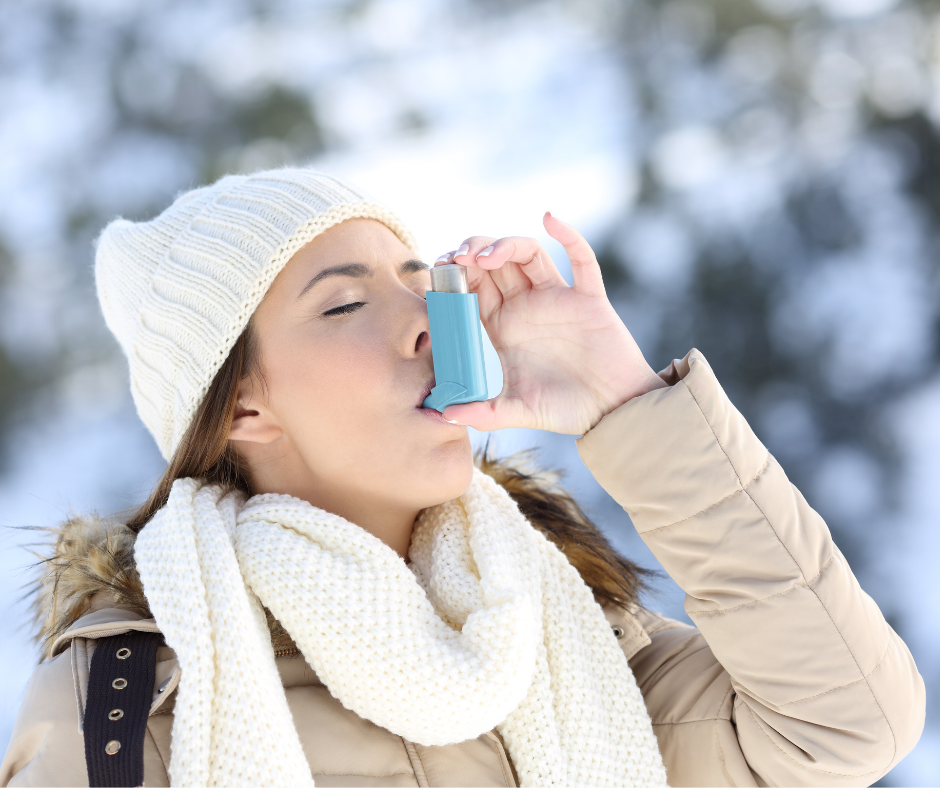How To Manage Winter Asthma?
March 27 2023 – Nysh Website

Winter is coming! It’s time to get those cozy blankets off your shelves and sip on some delicious hot cocoa. While some may await this season for embracing the cold weather, others tend to worry about the many challenges it brings. Winter comes with its own set of worries, especially to those suffering from asthma.
The cold dry air can cause difficulty in breathing and may cause asthma attacks. But don’t worry, with careful planning, you can breathe easy in the cold season. Here’s everything you need to know about how to manage winter asthma.
Tips On How To Manage Winter Asthma
- Invest In A Humidifier
- Avoid Exercising Outdoors
- Keep Yourself Warm
- Breathe Through Your Nose
- Know What Triggers You
- Keep Your Reliever Inhaler With You All The Time
- Protect Yourself From Viral Infections
1. Invest In A Humidifier
In winters, the air gets really dry and it is one of the common causes to trigger asthma. When the humidity is high, you must’ve experienced allergic reactions because of dust mites. But in winters, when it decreases, you can get irritation in your throat. So, investing in a humidifier is a good choice to keep the right level of humidity inside your home.
It will add moisture to the air and will help ease your breathing. It’s important that you buy a good quality humidifier and keep it clean. If you let your humidifier run non-stop and keep it unclean, it will worsen your asthma. So, make sure that you clean your humidifier at least once in three days.
2. Avoid Exercising Outdoors
Even if you see yourself as an enthusiast who loves to exercise outdoors, it’s something you need to avoid doing in winters. We know that it’ll feel like a form of punishment to you, but remember the old saying, ‘Prevention is better than cure’.
If you indulge in outdoor activities or any form of physical exercise in the cold weather, you can experience shortness of breath. A better alternative would be taking a fitness class indoors and doing light exercise like yoga or pilates.
3. Keep Yourself Warm
Of course, cold temperatures demand you to take out all your fluffy fuzzy wear like sweaters and gloves. But when clothes aren’t enough to keep you warm, you can also opt for good quality hand and body warmers.
As an asthma patient, a scarf is also a must in the cold season. All you have to do is cover your nose and mouth with a scarf when you’re outside. It’ll warm up the cold air before reaching your lungs so that the risk of a reaction is reduced. If you’re not comfortable using a scarf, a face mask will also do to create a buffer.
4. Breathe Through Your Nose
If you breathe through your mouth in winters, the cold air will travel straight to your airways. This might cause difficulty in breathing and could possibly trigger asthma symptoms. That’s why it’s important to breathe through your nose, especially in winters. It’ll help warm the cold air before it enters your lungs.
5. Know What Triggers You
As an asthma patient, you would be sensitive to allergens like pollen, molds, dust mites, strong odors, and certain chemicals in the air. This varies for different people depending on their sensitivity. Still, the point remains that it’s best to be aware of things that flare up your asthma symptoms.
If you’re aware you can take precautionary measures like cleaning your fans or air-conditioner filter before it provokes dust to take a spin in your house. Your steps to avoid triggers will help you get through winters and feel more in control of those flare-ups.
6. Keep Your Reliever Inhaler With You All The Time
Asthma patients should carry their reliever inhaler with them all the time. You never know when you’ll find yourself struggling with symptoms like shortness of breath. One day you can feel perfectly fine, while the next day you can experience pain in your chest or tightness of breath. For such unforeseen circumstances, a reliever inhaler will save your day. If you’re consistently dependent on your inhaler during winters, we advise you to consult your doctor.
7. Protect Yourself From Viral Infections
Winter is also a flu season that can exacerbate your asthma symptoms. It’s good to try your best to not catch a bad cold. You can do so by carrying a hand sanitizer and frequently washing your hands after you’ve been out. If you do catch a cold, be prepared with the medications you need and keep sipping on warm liquids to ease congestion. Along with that, you can make a regular visit to your doctor for recommendations on keeping your asthma conditions under control for winter.
Summing Up
Those were our tips on how to manage winter asthma. Sure, cold temperatures bring along a lot of challenges. But, with these measures, you can stay prepared. We hope that with our tips, you’re able to manage your seasonal triggers and get to enjoy the festivities that come along.
FAQs
How Do You Deal With Asthma In The Winter?
Some of the best ways to deal with asthma in the winter are investing in a humidifier, avoiding exercising outdoors, and keeping yourself warm. You can protect your mouth using a scarf or a mask to prevent cold air from entering your lungs.
How Do You Fix Seasonal Asthma?
One of the best ways to fix seasonal asthma is knowing what kind of exposure can trigger you. You should get in touch with your doctor to manage your allergies. Also, keeping your reliever inhaler with you all the time can help you in times when you’re falling short of breath.
Is Steam Good For Asthma?
For many asthma patients, warm air feels soothing. So, you can take a steam bath or a hot shower to clear the mucus which makes breathing difficult. Keep in mind that even people suffering from asthma can feel that heat is making it worse for them. So, it’s good if you consult your doctor and find out about your triggers and what’s best for you.
Is A Humidifier Good For Asthma?
Humidifiers can add moisture to the air and keep your nasal passages and throat moist. If your humidifier is not clean and you keep it running all the time, it can trigger or worsen your asthma symptoms.


0 comments